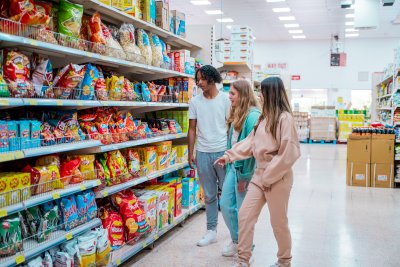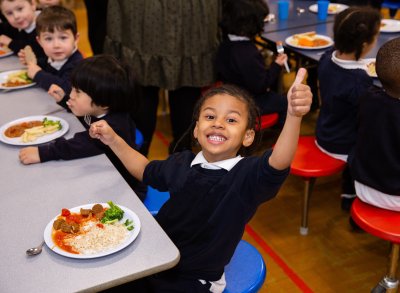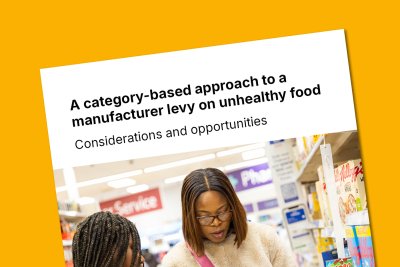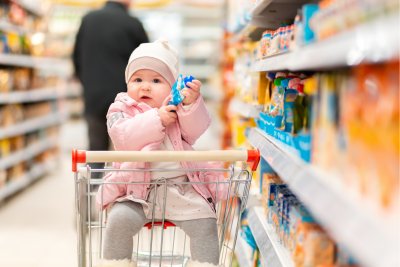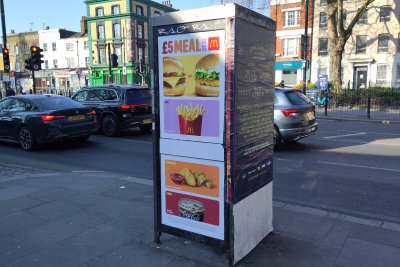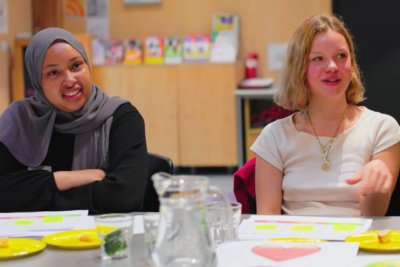 Photo credit: Sustain
Photo credit: Sustain

Government offers “crumbs” to hundreds of thousands of people struggling for food during Covid-19
Sustain reacts with dismay to the Government announcement today that they will provide £16m for food charities to help meet the astronomic rise in household food insecurity due to low income during Covid-19.
Speaking at the Government's Covid-19 daily briefing, Secretary of State for Defra George Eustice said, "Vulnerability is not just about physical access to food. For some, there is also financial vulnerability." He said that £16m had been allocated by the Government to the food distribution charity FareShare to support 5,000 frontline charities in England serving food in refuges, homeless shelters and rehabilitation centres, and to WRAP, the organisation working to reduce food waste. The money applies for the next 12 weeks.
In response to the Government announcement [1], Kath Dalmeny, chief executive of Sustain, the food and farming alliance, said:
“The government has consistently side-stepped its responsibility to help people who are running out of money to pay for food during Covid-19. They expect a fanfare for giving £16m to frontline charities, but this represents just a few days’ worth of food for the hundreds of thousands of people now struggling to put food on the table due to low income. What happens when these temporary, piecemeal handouts run out?"
“Frontline charities and volunteers are working fit to bust to help people get food, but at the gigantic scale of household food insecurity we are now seeing, charity is not the answer. Everyone able to get to the shops needs money so that they can buy food themselves, enabling frontline groups to focus on helping those struggling for other reasons such as homelessness, illness, disability or being housebound or isolated due to old age. We need an adequate social security safety net and a proper assessment of the income and food needs of millions of people in the UK over the months to come, not just crumbs from the table.”
During Covid-19, 1.8 million people have signed up for Universal Credit due to job losses, loss of contracts and closure of businesses [2], facing a five-week wait with no money or a repayable loan [3] followed by a very low level of income and reduced prospects of getting a job. Pre-Covid data from the Trussell Trust food bank network shows that the five-week wait for Universal Credit is one of the most common reasons for people running out of food and needing to resort to a food bank [4].
Charitable food banks have reported record numbers of people being referred during Covid-19 – up 81% since the same period last year, with 122% more children needing emergency food aid [5]. The Food Foundation estimates that 200,000 children have missed meals during Covid-19 lockdown [6]. Schools and local authorities are reporting having to provide emergency food parcels to children and their families, and many problems managing government vouchers for children who are eligible for free school meals due to their families being on a very low income [7].
On 29 April, the Government published Covid-19 advice to the public on “Accessing food and essential supplies: How to get food and other essential supplies during the coronavirus pandemic” [8]. Despite repeatedly being told by charities and voluntary groups over recent weeks that this must include advice on support available for people with insufficient money to buy food, the advice makes no mention whatsoever of difficulties accessing food due to low income. The advice appears to expect local authorities (and the frontline food aid groups and charities they work with) to pick up the pieces, yet with no indication of whether these are able or ready to do so, nor in any case if they have the adequate resources to respond to the growing level of need, and over an extended period.
Notes to editors
Sustain is deeply concerned that the government has so far failed to:
- Accept responsibility for addressing household food insecurity, instead largely passing the buck to supermarkets, local authorities and frontline charities to respond.
- Measure household food insecurity and hunger, to assess the scale of need and what sensible options there are for addressing this.
- Provide an adequate safety net for people on the lowest incomes struggling to access food, to prevent them falling into destitution and hunger.
- Assess the adequacy of support and identify the gaps and remedies.
- Present any kind of plan for how household food insecurity and hunger can be managed in the mid to longer term, as lockdown starts to ease but low incomes persist.
The Government has made some moves to help people on a very low income during Covid-19, including a £20 per week increase in Universal Credit for one year (£1,040 per head total) [9]; changes to the housing allowance in social security benefits [10]; extension of Free School Meal vouchers/value across the two-week Easter holiday [11]; extension of free school meal entitlement to some families who have the immigration status ‘No Recourse to Public Funds’ (following the threat of legal action) [12]; and a £150 decrease in Council Tax liability [13], which may or may not help people on a very low income, as many local authorities offer this already. Such moves are helpful, but are piecemeal and not based on assessment of need or impact. Yesterday (7th May 2020), the High Court ruled as illegal the Government's denial of social security support to people with the immigration status ‘No Recourse to Public Funds’ – some of the poorest people in the UK [14].
References
[1] Government press release, 8th May 2020: "£16 million for food charities to provide meals for those in need": https://www.gov.uk/government/news/16-million-for-food-charities-to-provide-meals-for-those-in-need
[2] Since the government advised people to stay at home due to coronavirus nearly two million people have applied for Universal Credit social security benefits. Work and Pensions Secretary Thérèse Coffey said there had been more than 1.8 million claims since 16 March 2020, a figure she said was six times higher than the normal claimant rate. She told a House of Commons inquiry that in one week there had been a tenfold increase in claims: https://governmentbusiness.co.uk/news/05052020/nearly-two-million-claim-universal-credit
[3] People signing up for Universal Credit need to wait five weeks for their first payment. They can take out an advance, but must pay this back from their subsequent benefits payments: https://www.trusselltrust.org/five-weeks-too-long/
[4] Research by the Trussell Trust, the UK's biggest network of food banks, shows that "The minimum five week wait for Universal Credit – either without income or with a Department for Work and Pensions (DWP) Advance Payment – has led to acute financial hardship, and damaged households’ longer-term financial resilience. This includes destitution, housing insecurity and debt." https://www.trusselltrust.org/what-we-do/research-advocacy/universal-credit-and-foodbank-use/
[5] The Trussell Trust reports a soaring 81% increase for emergency food parcels from food banks in its network during the last two weeks of March 2020, compared to the same period in 2019 – including a 122% rise in parcels given to children, as the coronavirus pandemic continues to unfold. Food banks in the Independent Food Aid Network (IFAN) report an average 59% increase in need from February to March. https://www.trusselltrust.org/2020/05/01/coalition-call/
[6] The Food Foundation estimates that 200,000 children have missed meals during Covid-19 lockdown: https://www.sustainweb.org/news/may20_children_skip_meals_in_covid19_lockdown/
[7] Headteachers have urged the Goverment to fix the free school meal voucher system that operates in England: https://www.ft.com/content/10f69aca-b5eb-41ea-b91c-1d9961e609a9. Different systems apply in the devolved nations: https://www.schoolfoodmatters.org/news/whats-happening-fsm-elsewhere-uk
[8] On 29 April, the Government published Covid-19 advice to the public on “Accessing food and essential supplies: How to get food and other essential supplies during the coronavirus pandemic”: https://www.gov.uk/guidance/coronavirus-covid-19-accessing-food-and-essential-supplies
[9] The Universal Credit standard allowance and the Working Tax Credit basic element will increase by £20 a week (equivalent to £1,040 a year) above the planned annual uprating. This will apply to all Universal Credit claimants and to existing Working Tax Credit claimants: https://commonslibrary.parliament.uk/insights/coronavirus-claiming-welfare-benefits/
[10] Local Housing Allowance rates will pay for at least 30% of market rents in each area: https://commonslibrary.parliament.uk/insights/coronavirus-claiming-welfare-benefits/
[11] On 6th April 2020, the Department for Education extended Free School Meal vouchers/value to apply for the two-week Easter holiday: https://www.bbc.co.uk/news/education-52183713
[12] In response to a judicial review pre-action letter from lawyers, the Department for Education agreed in April 2020 to extend free school meal entitlement to some families who have No Recourse to Public Funds: https://www.sustainweb.org/news/apr20_fsm_eligibility_nrpf/
[13] A Covid-19 hardship fund issued to local authorities makes provision for a decrease in Council Tax liability for people on a very low income of up to £150: https://www.gov.uk/government/publications/council-tax-covid-19-hardship-fund-2020-to-2021-guidance
[14] On 7th May 2020, the High Court has ruled as unlawful the denial of benefits to migrant families with 'no recourse to public funds': https://www.theguardian.com/society/2020/may/07/home-offices-denial-of-benefits-to-migrant-families-unlawful-court-rules
Food Poverty: Championning people-powered projects that tackle the root causes of food poverty.
Sustain
The Green House
244-254 Cambridge Heath Road
London E2 9DA
020 3559 6777
sustain@sustainweb.org
Sustain advocates food and agriculture policies and practices that enhance the health and welfare of people and animals, improve the working and living environment, promote equity and enrich society and culture.
© Sustain 2025
Registered charity (no. 1018643)
Data privacy & cookies
Icons by Icons8
